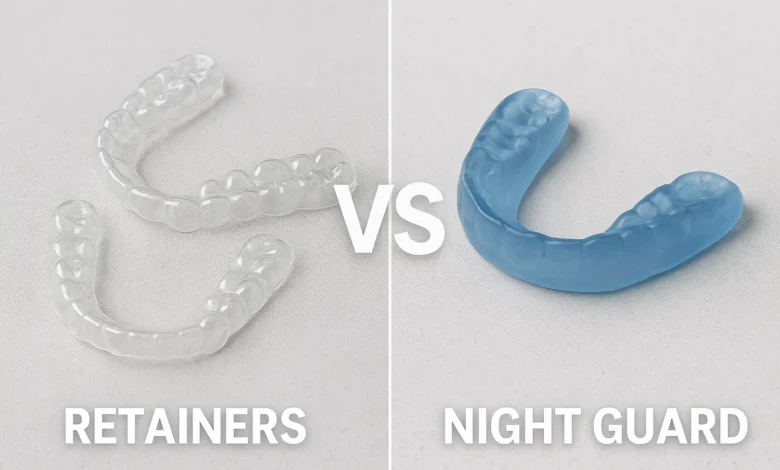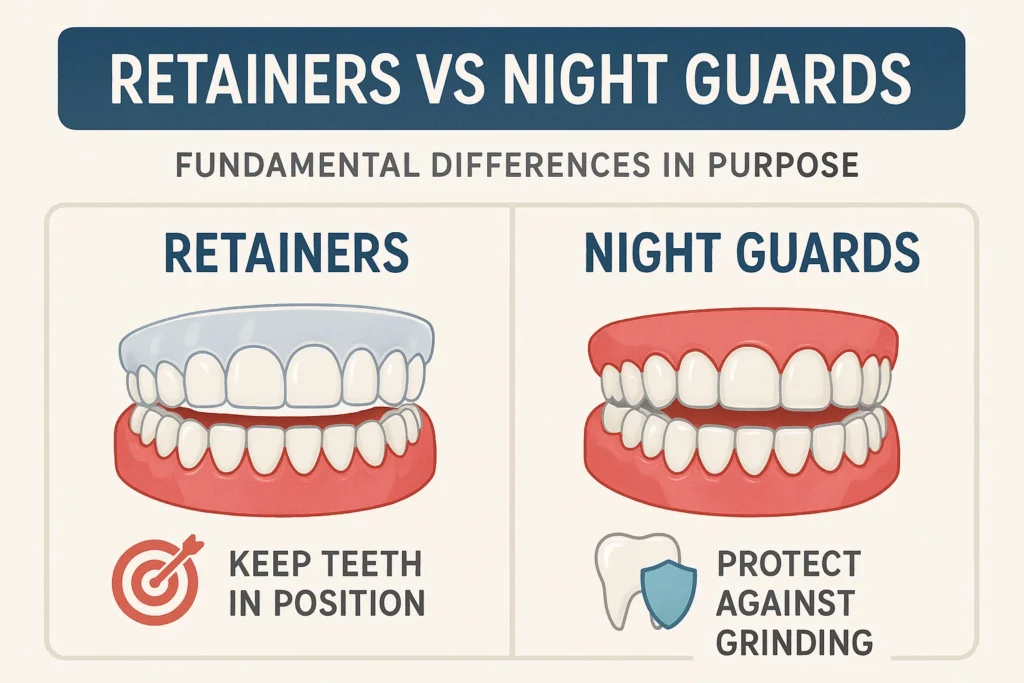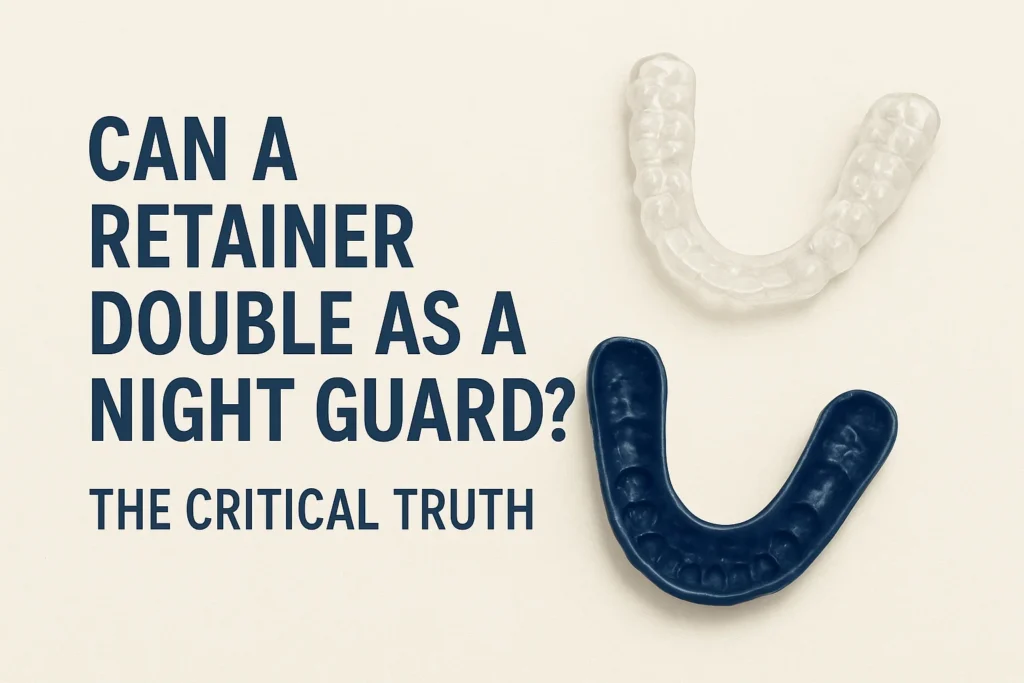Retainers
Retainers vs Night Guards: Benefits, Differences, and What to Choose

Retainers vs Night Guards: The Ultimate 2025 Expert Guide to Protecting Your Smile
Did you ever hear that about 30-40 percent of all adults grind their teeth at night and almost 25 percent of all orthodontic patients report some sort of tooth movement at some time after treatment? These are the two widespread dental problems, which have made millions of people seek oral appliances as a means of protection. Yet, with the numerous clear plastic appliances on the market, the problem of retainers vs night guards has turned out to be one of the most frequently asked questions to the dentists.They might appear the same to the naked eye, but having the unsuitable equipment to your dental issue may result in the expensive side effects of not having the necessary protection against grinding or orthodontic relapse and unwinding the years of your orthodontic work. This is the all-inclusive guide that breaks through the quandary with professional insight, clinical data and tips of the trade to get the correct oral health decision and investment.Retainers vs Night Guards: Fundamental Differences in Purpose

What Is a Retainer and What Does It Do?
Dental retainers are specially made devices that are used to hold your teeth at their present position following orthodontics. They are only used to prevent tooth movement they are not intended to resist these enormous forces produced by bruxism (teeth grinding).Key characteristics of retainers:- Constructed using lighter plastic (0.8-1.2mm thickness normally)
- Something to fit between teeth and appliance with a minimal space.
- Use low force, constant pressure so as to avoid movement of teeth.
- Frequently have wire elements to increase stability (Hawley retainers).
- Otherwise not designed to withstand strong biting.
What Is a Night Guard and What Does It Do?
A specially designed device that prevents the harmful impact of grinding and clenching teeth in the place of sleep is known as night guards (or occlusal guards or bruxism splints). They behave like a shield to intercept and share destructive forces.Key characteristics of night guards:- Crafted out of heavier and sturdier materials (2-3mm or more thickness)
- Made with a small distance between teeth so as not to hit hard.
- Built so as to endure the years of wear and tear.
- Frequently have a two-layered construction of soft and hard components.
- May has the jaw repositioned slightly to decrease the muscle strain.
Key Differences: Materials, Design, and Durability
While casual observers might mistake one for the other, retainers and night guards differ significantly in their construction, materials, and expected lifespan. These differences directly impact their effectiveness for their intended purposes.| Feature | Retainers | Night Guards |
|---|---|---|
| Primary Purpose | Prevent teeth shifting | Protect from grinding damage |
| Material Thickness | Thin (0.8-1.5mm) | Thick (2-4mm+) |
| Durability | Moderate (1-3 years) | High (3-7 years) |
| Fit Precision | Extremely precise | Protective with slight space |
| Cost Range | $200-$600 | $300-$1,000+ |
| Material Types | Acrylic, thin plastic | Multi-layer acrylic, specialized polymers |
| Professional Requirement | Always custom-made | Custom highly recommended |
Material Composition Differences
Retainers are typically made from:- Essix retainers: Clear thermoplastic (0.8-1.5mm thickness)
- Hawley retainers: Acrylic base with wire components
- Vivera retainers: Multi-layer, more durable plastic (Invisalign brand)
- Hard acrylic: Most durable option for heavy grinders
- Soft materials: More comfortable but may encourage grinding
- Dual-layer: Hard exterior with soft interior for comfort and durability
- Specialized polymers: Materials designed specifically to absorb impact
Can a Retainer Double as a Night Guard? The Critical Truth

Why You Shouldn’t Use a Retainer as a Night Guard
Using a retainer for teeth grinding protection presents several risks:- Inadequate protection: The bone material is too thin and might wear out easily exposing the teeth.
- Accelerated wear: The retainer will be destroyed by the forces of grinding and much more rapidly than it would otherwise.
- Poor retention: The retainer does not have teeth in place as the retainer is worn.
- Expensive replacement: You will have to change your damages retainer as well as have to have a decent night guard.
Why You Shouldn’t Use a Night Guard as a Retainer
Similarly, using a night guard as a retainer creates problems:- Improper fit: Night guards aren’t designed for the precise contact needed to prevent shifting
- Potential movement: Teeth may still shift despite wearing a night guard
- Bulkiness: Thicker material may feel uncomfortable for all-day wear
- Different pressure application: May apply pressure differently than intended for retention
Clinical Considerations: When You Might Need Both
For many people, the question isn’t simply retainers vs night guards but whether they need both. This is particularly common among orthodontic patients who also grind their teeth.The Orthodontic Patient Who Grinds Their Teeth
In case you have had orthodontic treatment and are a brux, probably you will need both devices. The normative procedure entails:- Wearing your retainer as ordered (full time at first, and then going on to work at night only)
- Your night guard should only be used after the wear time in the evening has passed.
Alternative Solutions: Combination Appliances
In some cases, your dentist might recommend a retainer and night guard combo appliance. These specialized devices:- Are thicker than standard retainers but more precisely fitting than night guards
- Typically feature a hard outer layer with a softer interior
- Must be custom-designed by a dental professional
- Can be more cost-effective than two separate appliances
Cost Comparison: Investment Versus Expense
When considering retainers vs night guards, cost often plays a significant role in decision-making. Understanding the price differences and what you’re paying for can help you make an informed decision.Retainer Costs Breakdown
Custom dental retainers typically range from $200-$600 per arch. Factors influencing cost:- Type: Hawley retainers generally cost less than clear plastic retainers
- Material quality: Higher-quality materials command premium prices
- Geographic location: Costs vary significantly by region and practice overhead
- Orthodontist versus dentist: Specialists may charge more
Night Guard Costs Breakdown
Custom night guards typically range from $300-$1,000+ depending on:- Material: Soft guards are less expensive as compared to dual-layered and hard acrylic guards.
- Difficulty: TMJ-appliances or the ones with special functions are more expensive.
- Laboratory: There are premium night guards dental labs.
- Dental insurance: Night guards have better chances to be in part covered by insurance. Although there are over-the-counter solutions to both types, studies reveal a much higher fit, comfort, and efficacy to professionally made appliances making them more costs effective in the long term, although in higher costs.
Care and Maintenance: Best Practices for Longevity
Proper care extends the life of both retainers and night guards and maintains their effectiveness. While similar, their care routines have important differences.Cleaning Your Retainer or Night Guard
Daily cleaning routine:- Rinse with cool water after each removal
- Brush gently with a soft toothbrush and non-abrasive cleaner
- Soak daily in appropriate cleaning solution
- Store properly when not in use
- Mild soap or non-abrasive toothpaste
- Specialized retainer/night guard cleaning tablets
- Diluted vinegar solution (for mineral deposits)
- Hot water (can warp plastic)
- Abrasive toothpaste
- Bleach-based cleaners
- Alcohol-based mouthwashes
Storage and Handling
Proper storage prevents damage, loss, and bacterial growth:- Always use a ventilated protective case
- Keep away from pets (who are attracted to saliva scent)
- Store in a cool, dry place away from direct sunlight
- Never wrap in napkins or tissue (leading cause of accidental disposal)
Frequently Asked Questions
Can I wear my retainer and night guard at the same time?
No, you can not use both appliances on the same arch. When you require both of these functions, you can choose between wearing your retainer during the recommended length of time and then moving to your night guard during the time of sleeping or you can buy an appliance that will have both of these functions or you can discuss with your dentist whether a more durable material of retainer can work in your kind of grinding.Does it have any products that can serve as a retainer and a night guard?
Other dental laboratories are providing combination appliances that would fulfill both roles, but are a tradeoff instead of being ideal at either. These are normally much thicker than the normal retainers but also much more accurately fitting than the night guard. They have to be tailor-made by a dentist as per your requirements.General life expectancy of all the appliances?
Retainers are generally 1-3 years with good care although most orthodontists suggest that they be changed every year so that they fit in perfectly. The night guards service normally takes 3-5 years and in some cases, the high quality custom guards are able to go on to 7 years. It will also require changing both of these appliances once they start to wear, become damaged, or do not fit well anymore.Would it be possible to use the same cleaner on retainers and night guards?
Yes, the vast majority of cleaning products offered to clean oral appliances can be used with both retainers and night guards. Find cleaning solutions or tablets, antimicrobial, and of a dental appliance type. Do not use toothpaste that is abrasive or cleaners that are based on bleach, these can destroy both types of devices.What do I know that I require a night guard rather than a retainer?
Such symptoms as: pain or stiffness in your jaw in the morning, having a headache when you wake up, your teeth being flat or broken, being chipped or having a restoration, having sensitive teeth, or your partner saying that he or she hears you grinding your teeth at night are some common symptoms of needing a night guard. Should any of these symptoms appear in you, then see your dentist and have him examine you.Conclusion: Making the Right Choice for Your Oral Health
The distinction between retainers vs night guards ultimately comes down to purpose: Removers keep the teeth in their places and night guards prevent destructive grinding forces. Although the two seem to look like each other, they are designed to have very different purposes that use different materials, designs, and durability features.Wrong usage of a device may cause insufficient protection, broken equipment, and finally, increased expenses. The biggest thing is to seek better advice of any dental practitioner who can diagnose you appropriately and advise what exactly you need to use whether it is retainer, night guard or in some cases a well planned combination appliance.A smile is a good investment you have. Use the correct tool to do the job of protecting your teeth and you can benefit in the long run on having correct teeth.Veneers Before After Crooked Teeth: See the Incredible Smile Transformations!